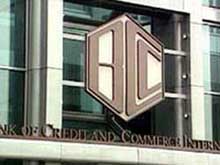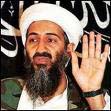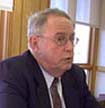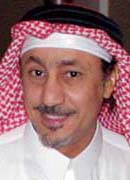By Lucy Komisar
May 27, 2007
President Bush‘s attorney general, Alberto Gonzales, has come under fire for politicizing the U.S. Justice Department for his dismissals of eight U.S. attorneys, apparently because they didn‘t target Democrats. But using the Justice Department for political ends isn‘t simply an invention of Gonzales or of the President; it‘s an old Bush family tradition.
In politicizing the Justice Department, U.S. President Bush takes a page from his father. The George H.W. Bush Justice Department 25 years ago balked at investigating and prosecuting the key players in the BCCI scandal and moved only, and in limited fashion, after New York District Attorney Robert Morgenthau forced its hand.
BCCI,  a criminal offshore bank, was a cozy partner of arms merchants, drug traffickers, financial manipulators, third-world dictators and terrorists, including Abu Nidal. It also committed fraud against its depositors, covering up investment losses, phony insider loans and embezzlement that, at as much as $15 billion, added up to the biggest bank fraud in history.
a criminal offshore bank, was a cozy partner of arms merchants, drug traffickers, financial manipulators, third-world dictators and terrorists, including Abu Nidal. It also committed fraud against its depositors, covering up investment losses, phony insider loans and embezzlement that, at as much as $15 billion, added up to the biggest bank fraud in history.
The Bank of Credit and Commerce International was founded in 1972 by a Pakistani banker, Agha Hasan Abedi, with the support of Sheik Zayed bin Sultan al Nahyan, the ruler of the oil-rich state of Abu Dhabi and head of the United Arab Emirates. It collected deposits largely from South Asian small businesspeople and immigrants. It bribed third-world officials to get their central bank deposits. And it laundered money for criminals of all stripes.
Norman Bailey, a U.S. National Security Council staffer who monitored world terrorism by tracking movements of U.S. money, began seeing BCCI‘s name in 1981. He said that the NSC learned that BCCI was involved with terrorists, technology transfers including the unapproved transfer of U.S. technology to the Soviet bloc, weapons dealing, the manipulation of financial markets as well as gun running and guerrilla movements, and embargo-and-boycott violations. BCCI routinely provided illicit arms traffickers with counterfeit documents and letters of credit.
(Bailey recently left his last intelligence job, at the Office of the Director of National Intelligence –ODNI.)
Bailey also became aware of a
relationship between BCCI and the CIA. CIA Director William Casey met with Abedi several times at the well-known Madison Hotel in Washington, across the street from the Washington Post.
The CIA used Islamabad and other Pakistani branches to funnel some of the $2 billion Washington sent to client Osama bin Laden  to finance the Afghani Mujaheddin fighting the Soviets. It spread cash to assure the passage of their weapons through the Karachi port and customs. It even organized mule convoys to transport the arms into Afghanistan. It moved the cash the Pakistani military and government officials skimmed from U.S. aid.
to finance the Afghani Mujaheddin fighting the Soviets. It spread cash to assure the passage of their weapons through the Karachi port and customs. It even organized mule convoys to transport the arms into Afghanistan. It moved the cash the Pakistani military and government officials skimmed from U.S. aid.
In the midst of its 20-year run, the bank that CIA Director Robert Gates called the Bank of Crooks and Criminals International moved into the U.S. It couldn‘t do so openly, blocked because its division into two offshore centers (Luxembourg and the Cayman Islands) meant that no bank regulator could see what was going on worldwide. So it decided to buy banks secretly, with the help of Saudi money-men and intelligence officials and with front-men, headed by Clark Clifford, who had been Lyndon Johnson‘s defense secretary.
Jack Blum,  special counsel to Senator John Kerry‘s Subcommittee on Terrorism, Narcotics and International Operations, was (after the rumors of Iran-Contra drug trafficking) investigating the relationship of narcotics law enforcement to American foreign policy. He found witnesses who told him about BCCI‘s connection to drug money laundering for the Medelln drug cartel and Panama strongman Manuel Noriega.
special counsel to Senator John Kerry‘s Subcommittee on Terrorism, Narcotics and International Operations, was (after the rumors of Iran-Contra drug trafficking) investigating the relationship of narcotics law enforcement to American foreign policy. He found witnesses who told him about BCCI‘s connection to drug money laundering for the Medelln drug cartel and Panama strongman Manuel Noriega.
He also discovered coming arrests for BCCI money-laundering in a Tampa, Florida, drug-trafficking investigation, Operation C-Chase. But the Justice Department was uninterested in Blum‘s evidence that took the case further, including tapes and meetings with bank insiders talking about the bank‘s widespread criminality and its illegal control of First American Bank in Washington D.C.
The bank was a dicey target for Bush for several reasons. One, because of the involvement of Saudi shareholders – some were intelligence officials and another invested in his son George W. Bush‘s business interests. And two, because the Reagan-Bush CIA had used it for black ops, illegal operations, not only to channel funds to al-Qaeda, but also for Iran-Contra payments and cash to Manuel Noriega.
The U.S. Justice Department sat on the evidence of BCCI‘s illegal activities and blocked investigations by others.
Federal attorneys later said that Justice Department officials told them that BCCI was a political case, and that Washington decided how to investigate and prosecute it. When Kerry‘s investigators tried to find out what the CIA knew, the agency repeatedly lied or withheld information. But Blum discovered the agency‘s ties to the bank. He found that during the 1980s, the CIA had prepared hundreds of reports that discussed BCCI‘s criminal connections”drug trafficking, money laundering”and its illegal control of First American Bank.
Those in the know, former CIA directors Richard Helms and William Casey, later lied and said that they hadn‘t a clue. The CIA blocked investigation of leads in the case. Documents were destroyed, an agent later reported. The CIA provided its reports to Treasury Secretary Donald Regan, who didn‘t act on them; the CIA did not provide information to the prosecutors in Tampa.
In October 1988, a month before the U.S. presidential election, Justice won a Tampa indictment of the bank and eight of its employees for laundering millions of dollars for the Medelln cartel. The indictment said nothing about Noriega, still on the CIA payroll, a relationship that Republican candidate Bush had initiated when he headed the agency.
Justice went for the narrowest case possible. It plea bargained with the bank and obtained a fine of $14 million”about what the undercover agents disguised as drug traffickers had deposited! It declined to use the RICO (Racketeer Influenced and Corrupt Organizations) law”invented to aid prosecution of drug traffickers”to attempt to confiscate the bank‘s assets.
The U.S. attorney agreed not to charge the bank or any affiliates with other federal criminal crimes under investigation or known to the government at the time of the execution of this agreement. Justice even wrote letters to state regulators asking them to keep BCCI open! The deal kept the bank alive and discouraged the jailed officials from telling more.
With Kerry‘s support, in 1989 Blum went to New York to see a local county prosecutor, District Attorney Robert Morgenthau. Blum told him about the Justice Department‘s refusal to look into BCCI‘s involvement in drug money laundering and other crimes. Morgenthau opened an investigation and ran into a wall of obstacles from Justice, which refused to cooperate, grant him access to witnesses or share information.
Then Morgenthau received an insider tip. The chairman of BCCI‘s internal review committee in London, Masihur (Arthur) Rahman, told his bosses that the bank‘s true finances had been distorted by deception and manipulation, and he resigned. He got phone calls threatening him and his family with death. Rahman contacted Morgenthau‘s office and revealed that Price Waterhouse audits had reported that, through a series of phony loans, BCCI had secret ownership of First American Bankshares, by then an $11-billion U.S. interstate bank holding company.
In May 1991, Kerry finally got a one-day hearing before a U.S. Senate banking subcommittee. Justice ordered key witnesses not to cooperate and refused to supply subpoenaed documents.
As time progressed, Morgenthau took tough actions, and Justice made the most limited case possible. In July 1991, based on information supplied by Morgenthau, a New York County grand jury handed down an indictment that named BCCI, its Cayman Islands subsidiary, and six individuals, including the BCCI president, Clifford and Altman. It charged that the bank was a criminal enterprise whose corporate strategy had been to seek out flight capital, black market capital, and the proceeds of drug sales.
Finally, in August, a federal grand jury in Tampa indicted six BCCI officials as well as a reputed Colombian drug baron, but not the bank president or the bank. It focused only on drug-money laundering and the connection to Noriega (no longer a Bush friend). It ignored leads, witnesses and evidence that would have revealed the bank‘s large scale frauds and exposed the CIA and Reagan-Bush illegal use of the bank.
In October, Assistant Attorney General Robert Mueller III  (now FBI chief), oversaw a federal grand jury indictment of Clifford and an associate. But he didn‘t go after Khalid bin Mahfouz, the BCCI shareholder who had invested in George W. Bush‘s oil enterprises, or other well-connected Gulf Arabs. In November, Justice announced another indictment focusing on BCCI‘s secret ownership in shares of two banks in California and Miami.
(now FBI chief), oversaw a federal grand jury indictment of Clifford and an associate. But he didn‘t go after Khalid bin Mahfouz, the BCCI shareholder who had invested in George W. Bush‘s oil enterprises, or other well-connected Gulf Arabs. In November, Justice announced another indictment focusing on BCCI‘s secret ownership in shares of two banks in California and Miami.
Finally, in December 1991, Justice issued a major indictment against the bank, which pleaded guilty to federal and state charges of racketeering involving money-laundering and the illegal takeover of First American and other U.S. banks. But only one of the accused was arrested, in France; by then the others were safely in the Middle East or Pakistan.
Morgenthau‘s investigation continued. In July 1992 a New York grand jury indicted Bin Mahfouz and an aide for defrauding BCCI and its depositors of as much as $300 million, using depositors‘ money to buy his bank shares. But Bin Mahfouz was safe in Saudi Arabia and settled for paying $225 million.
The Justice Department didn‘t go after Bush family friend and money source Bin Mahfouz at all.
In 1992, Bin Mahfouz established the Muwafaq (blessed relief) Foundation in the offshore Channel Islands. The Treasury Deprtment alled it an al-Qaeda front.
The missing BCCI money was never found. The Reagan-Bush political agenda kept the Justice Department from cracking down on BCCI early on and preventing the damage that missing cash may have done.

